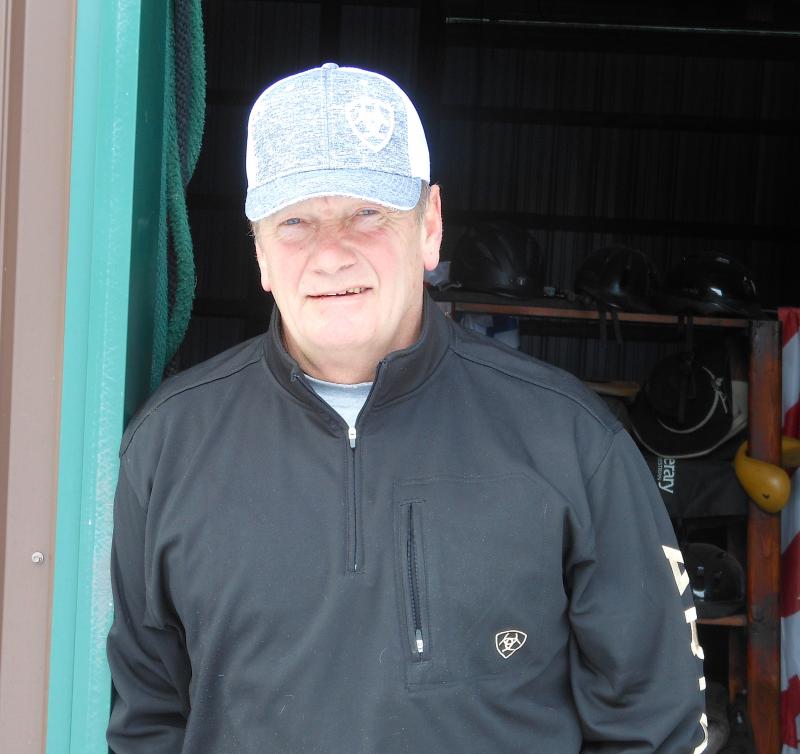Ellendale’s Dan Lynch has spent a lifetime with the equine species
Just a couple of days after Mother Nature opened 2018 with a snowstorm, and Dan Lynch was itching to get back on a horse.
"All last week, I rode every day," said Lynch, giving his two horses, Fluffy and Dolce, a treat while he lovingly strokes their heads. "This past weekend, all I did was shovel and plow snow."
Lynch, 57, and his wife, Julie, are the owners of Delaware Natural Hoof Care, off Route 16, closer to Ellendale than Milton. The couple have a little over 7 acres. There's a small house, a couple of small individual pens, a larger pen, a barn and an obstacle course.
For the past 15 years, they've been slowly, but surely, building a base of customers who, like them, believe in natural hoof care for horses. Lynch said they have a few hundred customers in Delaware and Maryland's Eastern Shore. Julie focuses on the numbers. Lynch focuses on the horses.
"At one time we were the only people in the state doing this," said Lynch. "Right now, we're not even traveling like we used to. Basically, we're here in Sussex County."
Lynch said he's worked with horses his entire life.
"Some of my earliest memories are in the stables with my cousin," he said.
Lynch said he's always been able to communicate with horses. He said the key to getting horses to relax is showing them empathy. He said horses assume humans are predators, until they show they're not.
"There's a lot of things that can be done to help a horse react well to humans, but they come once a person learns how to interact with them on their level," he said.
Lynch said in his business, many farriers will go straight to the hoof, which results in the horse immediately being skittish and defensive.
"You've got to remember horses know if they lose their leg or hoof, they're dead," he said. "A horse can get used to the action of a person working on their hoofs, but it takes empathy."
Lynch said he got into natural hoof care after a show horse he owned began to founder, a foot condition caused by inflammation of laminae holding the coffin bone and hoof together. Lynch described foundering as the hoof basically trying to disconnect from the horse. He said his veterinarian at the time was giving him advice that he just didn't like, so he started looking into natural hoof care.
"What I was being told to do didn't feel right, so I went home and started reading up on natural hoof care. I ordered some more books, bought some tools and went to work," he said, sitting in a living room chair next to a bookshellined with horse care books. "I was being told it could take 12 to 14 months for my horse to recover, but he was sound, with a whole new foot, in 5 months."
Lynch said horses with shoes get their hooves trimmed flat, which isn't natural. He said he trims curves into the hooves he works on, which allows for natural expansion and contraction.
"The curves allow a hoof to flex in different directions, not just outward," he said. "You should be able to give a horse a break from shoes every now and then."
A horse's foot has to be allowed to develop, and if they're in shoes all the time, that won't happen, said Lynch.
Lynch said he recognizes many horse owners still use shoes, and the idea of not shoeing a horse can be controversial. Shoes are a tradition, and change is hard, he said.
"I used to be just like that," he said. "I couldn't wait to see my horse in new shoes."
Lynch said natural hoof care was based in theory for a long time – long before horseshoes were introduced 1,000 years ago, horse hooves were naturally resilient. Now, he said, because of people like Dr. Robert Bowker of Michigan State University, there's science backing up natural hoof care.
Lynch said the hardest part about learning natural hoof care was learning how to use the tools properly.
Lynch said horses are pack animals and they'll follow the alpha individual in the group. He said that works in the case of the relationship between human and horse too.
Lynch said he can get a new horse to follow and listen to him in less than 20 minutes. He said gets them moving first, by chasing them for a bit in a round pen. Then Lynch gives them a few minutes before walking up to the horse and rubbing it on the head.
"Then I'll turn around, and they'll follow," he said.
Jokingly, Lynch said his life lacks balance. "Everything I do really is about horses," he said. "I do it for pleasure, and it's my business and passion."


















































